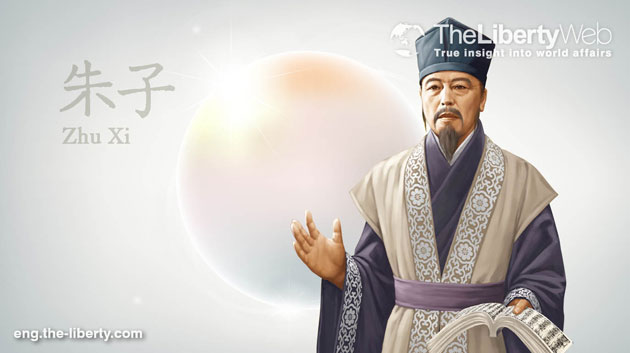The Spiritual Messages of Zhu Xi (Chu Hsi):
A Reincarnation of the Ancient Roman Philosopher Cicero
Master Okawa summoned the spirit of Zhu Xi (1130 – 1200), who was another of China’s highly influential Confucian thinkers and an exponent of Neo-Confucianism, which followed in the footsteps of China’s Wang Yangming. Neo-Confucianism arrived in Japan during the Edo Period, and it contributed to peace and stability within the academic mainstream, but according to the spirit of Zhu Xi, the Meiji Restoration was a revolution that embraced a Japanese style of the Neo-Confucianism, which both Zhu Xi and Wang Yangming expounded.
The spirit of Zhu Xi revealed that during the Song Dynasty Buddhism was dominant religion over the traditional Confucianism of Confucius and Mencius. At that time, the goal of Neo-Confucianism, as Zhu Xi expounded it, was to be an effective rallier of Confucianism while also being a practitioner of the precepts of Buddhism. This was how Zhu Xi established Neo-Confucianism.
Confucianism provided the basis for political stabilization, and the spirit of Zhu Xi thought that it was important because peace was responsible for the spread of prosperity throughout Japan.
“I believe it was also practiced during the Tokugawa Era in order to bring stability to the country, since it was possible to use it to preach the tenets of loyalty and filial piety. That seems to have actually been the reason. Warring ceased and peace continued. I think that Japan should take pride in this period in history since the Tokugawa Era and the Heian Period afforded Japan centuries of uninterrupted peace.”
He next explained the relationship between Confucianism and Shintoism in great detail, “Despite demonstrating what appeared to be Confucianism, it actually had an extremely strong affinity with Japan’s original ideology of reverence for the Emperor, an ideology in which an imperial household ruled the country from heaven.” He revealed the links between them.
Then, with regard to the Meiji Restoration, he said, “Various foreign countries had revolutions in order to abolish their monarchies. This heralded a world of democracy and ushered in the modern era, but because the Meiji Restoration did not fall under the same category, the restoration of imperial rule simultaneously occurred. I think that demonstrated the uniqueness of Japan.” He noted, “In contrast, since I think that the Neo-Confucianism, expounded by Wang Yangming, showed its strength through the expulsion of foreigners and the opening of Japan to the world, the Meiji Restoration in fact heralded a Japanese-style conflict between the Neo-Confucianism expounded by Zhu Xi and that propagated by Wang Yangming,” which revealed the spiritual truth behind the Meiji Restoration.
He also touched on the protest campaigns in contemporary China conducted by newspaper agencies against the government’s regulation of the press, “In the December lecture entitled ‘What is Global Justice?’ I said ‘The Chinese government must give its people the right to know’. I aimed that remark at China. That should have definitely resonated with some people.” His comments proved that the material, disseminated by Happy Science, has had a great impact even on the people of China.
Zhu Xi was himself a reincarnation of the ancient Roman philosopher Cicero (106 BC – 43 BC), and he even returned to modern Japan, as Yukichi Fukuzawa (1835 – 1901), where he unlocked the door to Westernization. In its heyday, Confucianism spread from China to Japan and made it prosperous. Even now, it maintains a link with and exercises significant influence over Happy Science’s global ideology and practices.



















